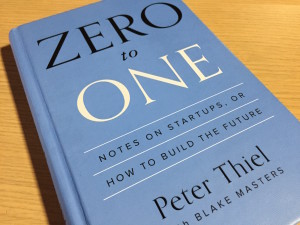 There was a book written about entrepreneurial success by Bo Peabody called Lucky or Smart? that springs to mind whenever I read books by “successful” CEOs and entrepreneurs. Peter Thiel obviously has some pretty good credentials, and it’s easy to conflate that success with wisdom. Too often celebrity professionals don’t back up their ideas because they don’t have to – we just assume that because they are successful they must be right. I think Zero to One skirts this nebulous zone. I wouldn’t read this as a “how-to” book, but rather as a way to meditate on what it means to create in the business world.
There was a book written about entrepreneurial success by Bo Peabody called Lucky or Smart? that springs to mind whenever I read books by “successful” CEOs and entrepreneurs. Peter Thiel obviously has some pretty good credentials, and it’s easy to conflate that success with wisdom. Too often celebrity professionals don’t back up their ideas because they don’t have to – we just assume that because they are successful they must be right. I think Zero to One skirts this nebulous zone. I wouldn’t read this as a “how-to” book, but rather as a way to meditate on what it means to create in the business world.
Big Thought
Building a start-up company is going into uncharted waters …it is an act of creation. It’s going from 0 to 1. The goal is to create things that are better, not just different. That requires truly new and fresh thinking, not an incremental change from the past.
Ideas, Implications, and Questions
- Peter’s take on competition is interesting…in that he’s against it. Or rather he is against the “ideology of competition” and feels that entrepreneurs don’t have the luxury of being caught in it. (pg 35) He would argue that competition forces all of the profit out of a business because it has to struggle with its peers. That why a start-up should look to monopolize a niche. He thinks they should “Start small and monopolize” in a small market where they have a massive advantage due to innovation. (pg 53)
- In the chapter If You Build It, Will They Come, Peter points out the importance of sales and distribution for start-ups. “If anything, people overestimate the relative difficulty of science and engineering, because the challenges of those fields are obvious. What nerds miss is the it takes hard work to make sales look easy.” (pg 128) I used the same Field of Dreams metaphor in an article extolling solopreneurs to not wait around for clients. It’s a common human wish for customers to just show up out of the woodwork, but it doesn’t happen. No matter what you are doing, there is an element of sales necessary for success.
- Something to keep in mind if you are starting or joining an entrepreneurial venture: “Ownership – who legally owns the company’s equity? Possession: who actually runs the company on a day-to-day basis? Control: Who formally governs the company’s affairs?” (pg 110). When these are different and competing, be ready for some bumps.
- I pulled something practical out for myself from the chapter on the distribution doldrums. The idea that there is a “no-man’s land” between personal sales and traditional advertising is valuable. Sometimes there is a dead zone for a product or service and there might not be a good distribution channel. In some ways, you either want what you are offering to be large and complex or simple and cheap.
- Peter has this whole thing with contrasting “definite” and “indefinite” outlooks by people and societies. This is where he loses me. While an interesting idea, I don’t think it holds up under scrutiny and reads more like a justification for his own personal opinions (like the need for hyper-specialization in education instead of a broad perspective) than a nuanced analysis of history. My guess is that a lot of advances have been made, not by the savants who know only one subject, but the ones who can make connections between widely divergent areas of expertise. But that could also be the justification of a guy who writes books on networking…
Should you read this book? Who should read this book?
“But while I have noticed many patterns, and I relate them here, the book offers no formula for success. The paradox of teaching entrepreneurship is that such a formula necessarily cannot exist: because every innovation is new and unique, no authority can prescribe in concrete terms how to be innovative.” (pg 2)
So if you can resist the temptation to use this book as a blueprint, there’s a lot to be gained. One of my tests for the quality of a book is whether it creates both “head nodding” and “severe irritation”. Based on that test, Zero to One is fantastic because I think that Peter is right on the money in some regards and way off base on others. Pick it up if you are:
- An entrepreneur in the start-up world. It was written for you so you might as well pick it up.
- A Creative professional or artist who has a business turn of mind. Creating companies and art is very similar.
